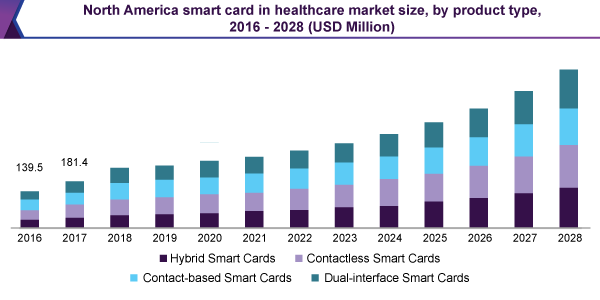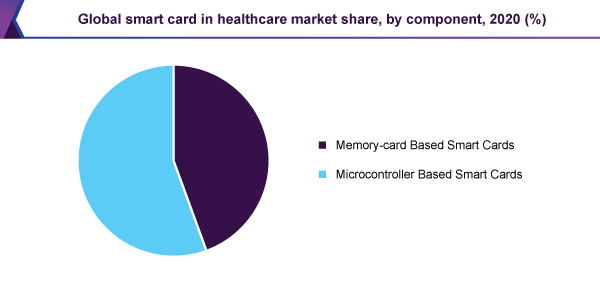- US: +1-408-610-2300
- Toll Free: +1-866-831-4085
- Become a Client
The global smart card in healthcare market was prized by USD 1.01 billion in 2020. It is estimated to witness 12.4% CAGR from 2021 to 2028.
The rising global digitalization of the healthcare structure plus the utilization of smart cards, to store up information pertaining to the patients in addition to make sure greater levels of confidentiality are the factors, projected to increase the enlargement of the market for smart card in healthcare. Growing government inventiveness, meant for the execution of smart cards within the healthcare arrangement is, moreover, estimated to enhance the expansion of the market.

For example, in 2008, the government of India initiated the Rashtriya Swashthya Bima Yojana (RSBY). The system relies completely on a national digitally manufactured article, which is made detectable by the RSBY smart card. Roughly 120 million Indians are enrolled in the RSBY record, by means of these smart cards, till April 2020.
Smart cards help healthcare personnel in keeping the good organization of patient treatment as well as protect confidentiality. Moreover, these cards permit the secured storing of the information regarding the patient’s health check record. Furthermore, instantaneously access the data at the same time makes possible the necessary updating of the data, if necessary. This decreases the possibility of healthcare frauds, therefore advancing the development of the smart card in healthcare market.
The Covid-19 pandemic influenced the healthcare activities and the ripple out comes were observed in the healthcare IT business also. The companies working in the smart card market accounted a fall off or flat in their sales of smart cards.
|
Pandemic Impact |
Post COVID Outlook |
|
The earlier projections depicting approximately 7.6% YoY growth were countered by the pandemic resulting in the difference of ~0.11 USD million revenue in the earlier and recent estimations. |
The market is expected to recover beyond 2020, with a CAGR of 7.68% from 2020 to 2021 and 8.85% from 2021 to 2022. |
|
Thales Group experienced a decline of 7.67% in its total revenue from 2019 to 2020. |
Market players are expected to experience high demand for their contactless smart cards. |
|
|
Governments of various countries are also expected to adopt smart cards in their healthcare systems for efficient healthcare data management. |
For example, the parent group of IDenticard Systems, Brady Corporation, stated a drop of 9.1% in its IDS section. This contains smart cards, designed for healthcare function. Likewise, Thales Group described a 2.0% drop in its expansion speed, during 2019 to 2020. Recurrent lockdowns along with insufficiency in supply chain were mainly accountable for the delayed acceptance.
In 2020, contactless smart cards section detained the major, more than 28.0% share of the smart card in healthcare market. The increasing acceptances of contactless smart cards, due to their advantages above contact-based smart cards plus no necessity of a reader are the factors, likely to increase the expansion of the section. They operate by means of radio frequencies or NFC technology that creates wireless contact amid the smart card and where it is wished-for use.
The hybrid smart cards section is projected to develop by the highest 14.6% CAGR, during the forecast period. These smart cards are made up of above one card technology. For example, they may have an implanted microprocessor smart card together with a contactless RFID proximity chip. In contrast, dual interface smart cards make use of a sole chip technology, to interconnect, by means of together contactless as well as contact-based interfaces.
In 2020, the microcontroller-based smart cards section detained the major, above 55.0% share of the smart card in healthcare market. They are transportable, in addition to possess huge memory. This is anticipated to increase the augmentation of this section, throughout the forecast period. Owing to its rising acceptance in the healthcare sector, the section is likely to increase by the highest CAGR, during the forecast period.

The memory-card-based smart cards section detained the subsequent major share, in 2020, because these cards are utilized merely for temporal functions. Their memory capability is pretty short and is frequently discarded, once used. Accumulated information cannot be edited or changed in these categories of cards.
Europe detained the major, more than 30.0% revenue share of the market for smart card in healthcare, in 2020. Increasing plans by a variety of non-government in addition to government associations, intended for guarantee the superior healthcare amenities are expected to boost the demand for the product, within this region.
The European Health Insurance Cards are distributed, without charge, to the inhabitants of 32 nations. A numerous European nations contain their individual national healthcare ID card. These factors are estimated to increase the development of the market.
The Asia Pacific market is expected to record the highest 13.2% expansion speed, during the forecast period, due to the factors like positive programs by the government, along with technically sophisticated healthcare infrastructure. Also, the local market is projected to develop into the major investor, by 2028.
The companies are spending on various tactical actions such as acquisitions, product presentations, joint accords, and geological growth, to maintain them in the market for smart card in healthcare.
• Card Logix Corporation
• Texas Instruments Incorporated
• Infineon Technologies AB
• Atos SE
• IDenticard Systems
• Thales Group
• NXP Semiconductors
• Giesecke+Devrient GmbH
|
Report Attribute |
Details |
|
Market size value in 2021 |
USD 1.09 billion |
|
Revenue forecast in 2028 |
USD 2.46 billion |
|
Growth Rate |
CAGR of 12.4% from 2021to 2028 |
|
Base year for estimation |
2020 |
|
Actual estimates/Historical data |
2016 - 2019 |
|
Forecast period |
2021 - 2028 |
|
Quantitative units |
Revenue in USD million/billion & CAGR from 2021 to 2028 |
|
Report coverage |
Revenue forecast, company share, competitive landscape, growth factors and trends |
|
Segments covered |
Product type, component, region |
|
Regional Scope |
North America; Europe; Asia Pacific; Latin America; Middle East & Africa |
|
Country Scope |
U.S.; Canada; Germany; U.K.; France; Italy; Spain; Japan; China; India; Brazil; Mexico; Argentina; South Africa; Saudi Arabia |
|
Key companies profiled |
Atos SE; Giesecke+Devrient GmbH; Infineon Technologies AB; NXP Semiconductors; Texas Instruments Incorporated; Thales Group; CardLogix Corporation; IDenticard Systems |
|
Customization scope |
Free report customization (equivalent up to 8 analysts’ working days) with purchase. Addition or alteration to country, regional & segment scope. |
|
Pricing and purchase options |
Avail customized purchase options to meet your exact research needs. |
This report forecasts revenue growth at the global, regional, and country levels and provides an analysis of the latest industry trends and opportunities in each of the sub-segments from 2016 to 2028. For the purpose of this study, Million Insights has segmented the global smart card in healthcare market report on the basis of product type, component, and region:
• Product Type Outlook (Revenue, USD Million, 2016 - 2028)
• Hybrid Smart Cards
• Contactless Smart Cards
• Contact-based Smart Cards
• Dual-interface Smart Cards
• Component Outlook (Revenue, USD Million, 2016 - 2028)
• Memory-card Based Smart Cards
• Microcontroller Based Smart Cards
• Regional Outlook (Revenue, USD Million, 2016 - 2028)
• North America
• U.S.
• Canada
• Europe
• U.K.
• Germany
• France
• Italy
• Spain
• Asia Pacific
• Japan
• India
• China
• Latin America
• Brazil
• Mexico
• Argentina
• Middle East & Africa
• South Africa
• Saudi Arabia


Research Support Specialist, USA